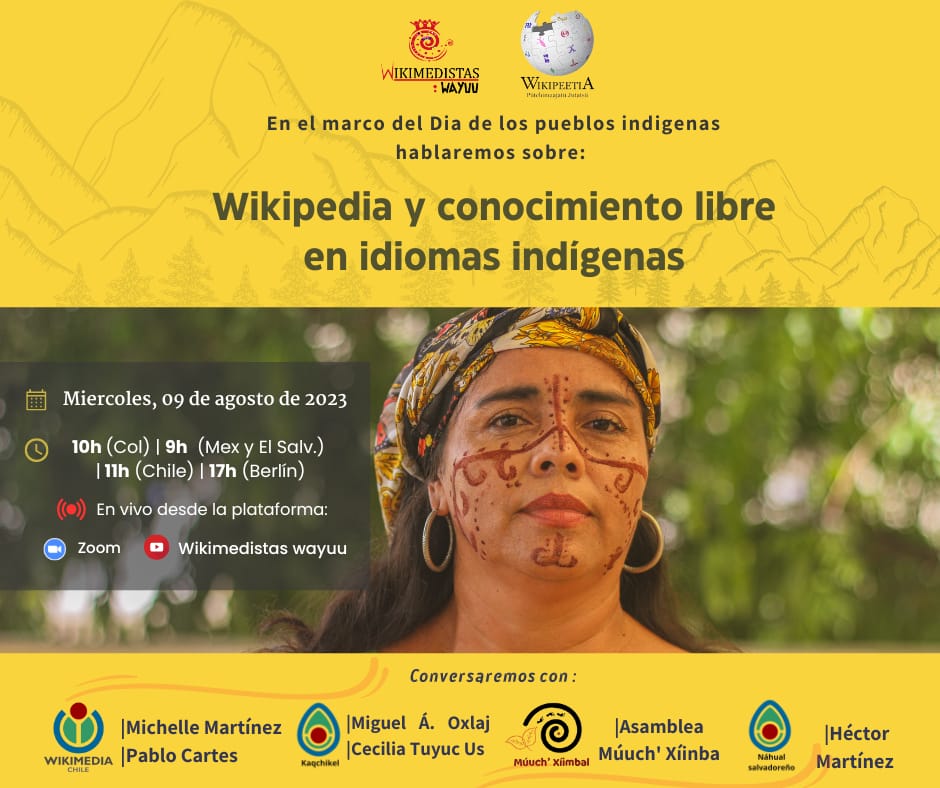Wayuu women learn from an early age to weave, and they will teach their daughters and granddaughters the art of weaving. Experiences like this (and many more) are what allow the wayuu people to keep a large part of their practices and traditions, anchored in fundamental experiences such as education and oral transmission of knowledge throughout several generations.

Transferring knowledge in indigenous communities such as this, materializes in those actions that give sense to their social and cultural processes, and this is a fundamental facto to keep alive the memories that created that knowledge in the first place. However, the transmission of cultural knowledge is currently affected by the introduction of external information that minimizes and sets aside these other ways of understanding the world. According to Levi Strauss (1962), indigenous knowledge is part of the group’s cultural collection, and also belongs to the individuals; this knowledge underlies the thought structure and comes from a process of “abstraction”, inn which the indigenous group relates to their world through thought.
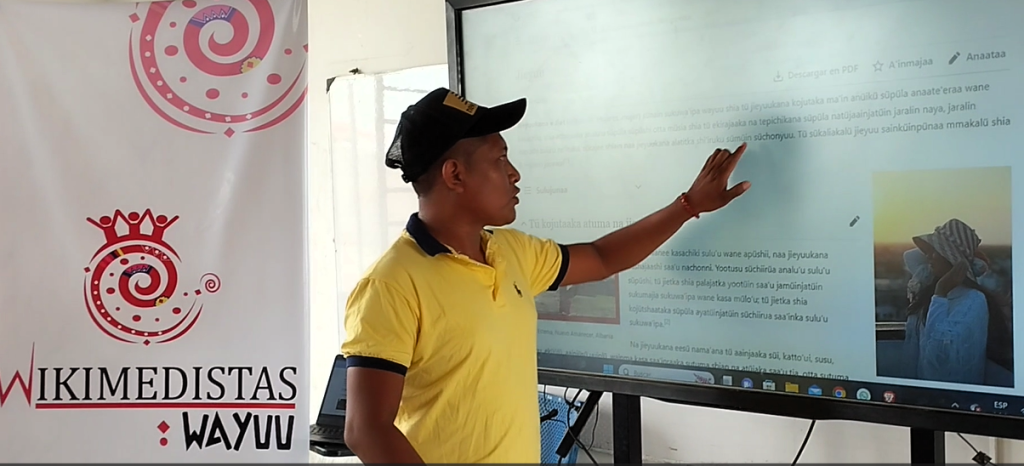
Leaderships and local actions
Both colonial history and official history, as established from a territorial (and cultural) centralism, encouraged a narrative that degrades the social and cultural values of the groups and territories on the outskirts. In the case under discussion, and considering the persistence of such narratives, our job is focused on dismantling this discourse that minimizes local knowledge, and we do it so hand in hand with social actors and leaders that share our way of thinking.
Through the last months of 2023 and first of 2024, aided by the Wikimedia Foundation, we started building important alliances with local leadership and institutions that align with our group and collective goals. During the second half of 2023, we aided the socialization events done by local leadership who, in collaboration, have also contributed to territorializing the Wikimedia projects in their local contexts.
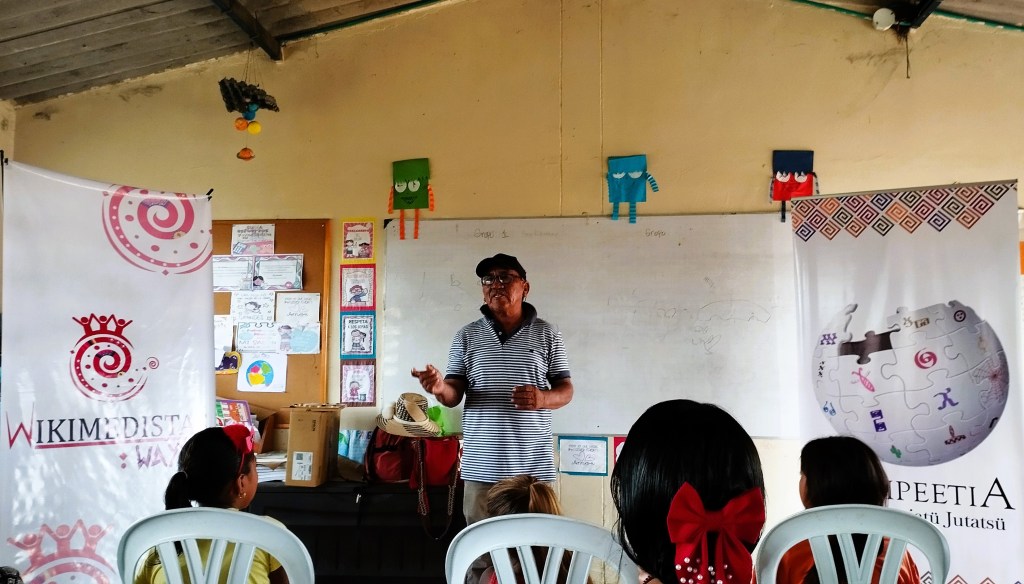
Similarly, our group had access to workshops to verify information, working together with the Center for Internet and Society of the University of Rosario (ISUR) and with Wikimedia Colombia (WMCO). We also managed to strengthen joint work between the Library of the Bank of the Republic and Wayuu Wikimedians. This alliance has allowed us to select and track down available contents at the Library and then share them in our version of the local network, which is a bridge to socializing contents offline, as well as socializing Wikipeetia and Wikipedia.
In the last 12 months, we successfully met with several wayuu communities and schools, including Piyushipana (Col), Maracarí (Col), Julio Rosado (Col), Asentamiento 3 de Abril (Col), Ulerii (Ven), Fe y alegría (Ven), Orangel Abreu (Ven), and Francisco Babbini (Ven). We started concrete works with some of those schools in the form of micro-projects supervised by wayuu leadership, who helped their students to present Wikipedia in the wayuunaiki language, as well asits educational reach.
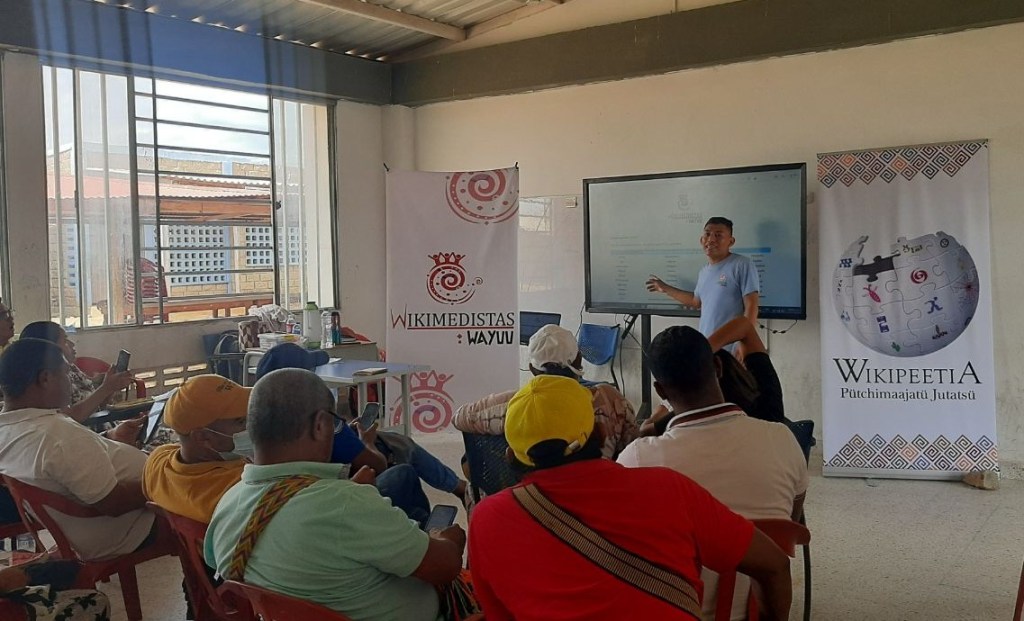
Among the micro-projects there were:
- Wanee ekirajawaa jeketü (A new [way of] teaching). Group from the Piyushipana community.
- Creative reading and writing in wayuunaiki. Group of teachers from the «Escuela Fe y Alegría Paraguaipoa» school.
- Sukujalaa Wayuu (What the Wayuu tell). Group of teachers from the «Escuela Francisco Babbini» school at Guarero.
Together, the local micro-projects had over 250 students from 3 schools. These served as spaces for reflection and awareness of using wayuunaiki in educational spaces. In parallel, the Wikimedistas Wayuu group spoke at several schools in the Riohacha District as part of the commemorations of the national Day of Languages. This presentation was done aided by the Bank of the Republic, at their own local headquarters.
First anniversary of the Wikipeetia
On March 2, 2024 the Wikimedistas Wayuu group met at Riohacha (Colombia), to celebrate the first year of guc.wikipedia.org, on this occasion the leaders of the microprojects were invited to speak about their experiences and the reach they saw at their schools and communities. Other local allied organizatioons at the event were Wikimedia Colombia, the Center of Internet and Society of the Rosario University (ISUR), KARISMA, Kojutajirawaa collective, and the Cultural team at the Bank of the Republic at Riohacha.
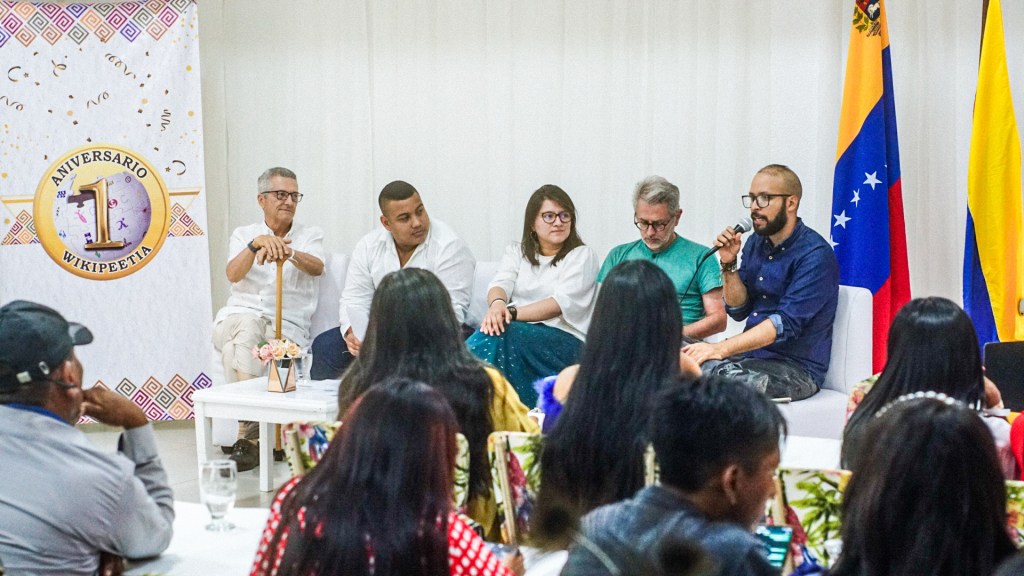
En los paneles organizados para dicha actividad, los wikimedistas wayuu, en cabeza de los profesores: Humberto Ramírez, Soraya González, Ruberlys González y Juana Obediente, mostraron adelantos de sus acciones desde sus lugares situados y además reflexionaron sobre la importancia de fortalecer el uso del idioma wayuunaiki en todos los ámbitos.
Transferencia de conocimiento
Wikimedistas Wayuu (WMWA) lideró un proceso de formación dirigido a los líderes y lideresas de los microproyectos locales, dicha formación constó de ejercicios para aumentar las habilidades y capacidades de los docentes convocados, en estos talleres se tocaron temas como: neologismos y la correcta escritura del wayuunaiki, taller dictado por José Ramón Álvarez, documentación en fotografía con Brayan Salguedo, la etnografía y la documentación de la cultura wayuu de la mano de Zaidy Fernández, especificaciones del proceso de edición por Leonardi Fernández y finalmente un taller de prototipado para la formulación de los microproyectos.
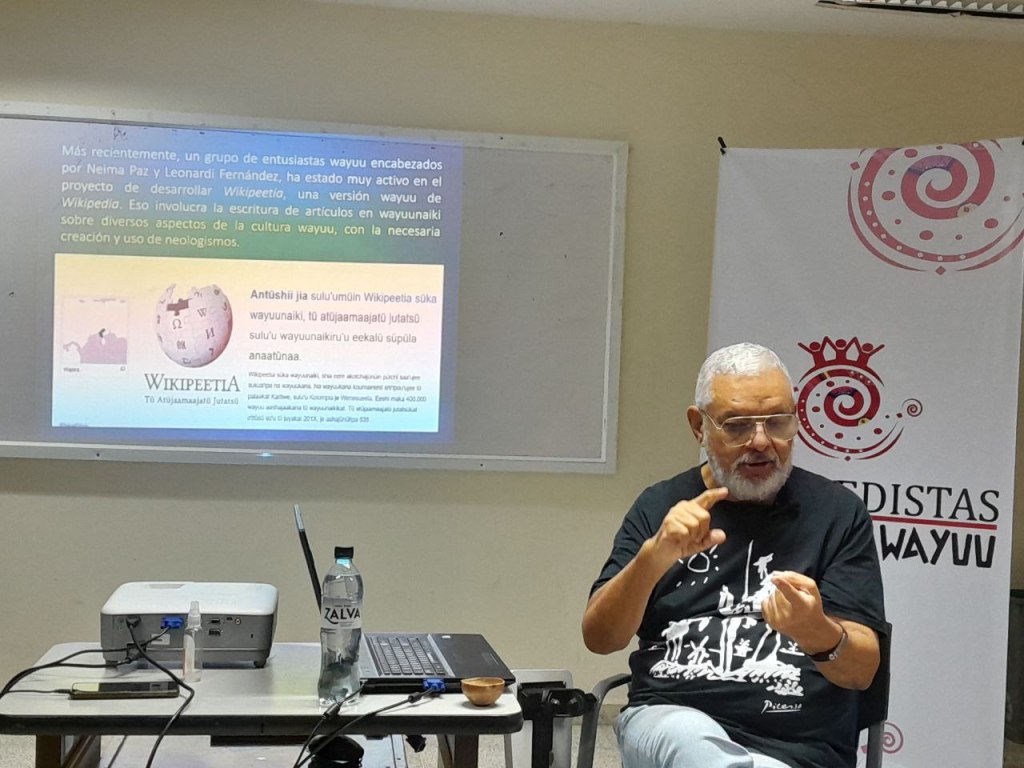
Afterwards, the teachers put their knowledge to use and shared it with their own students, communities, and social circles. During this stage, the strategy of WMWA was that local leadership should be the protagonist, so as to de-centralize the territorialization process of the Wikimedia projects.
At Wikimedistas Wayuu we know that believing in the communities’ and local leaderships’ own capacities is fundamental to ensure the good development of local processes. At the same time, this also lends them the opportunity to create actions to validate projects. This is most important in processes as trasnscendental as sistematizing their own knowledge and wisdom in a non-dominating language.
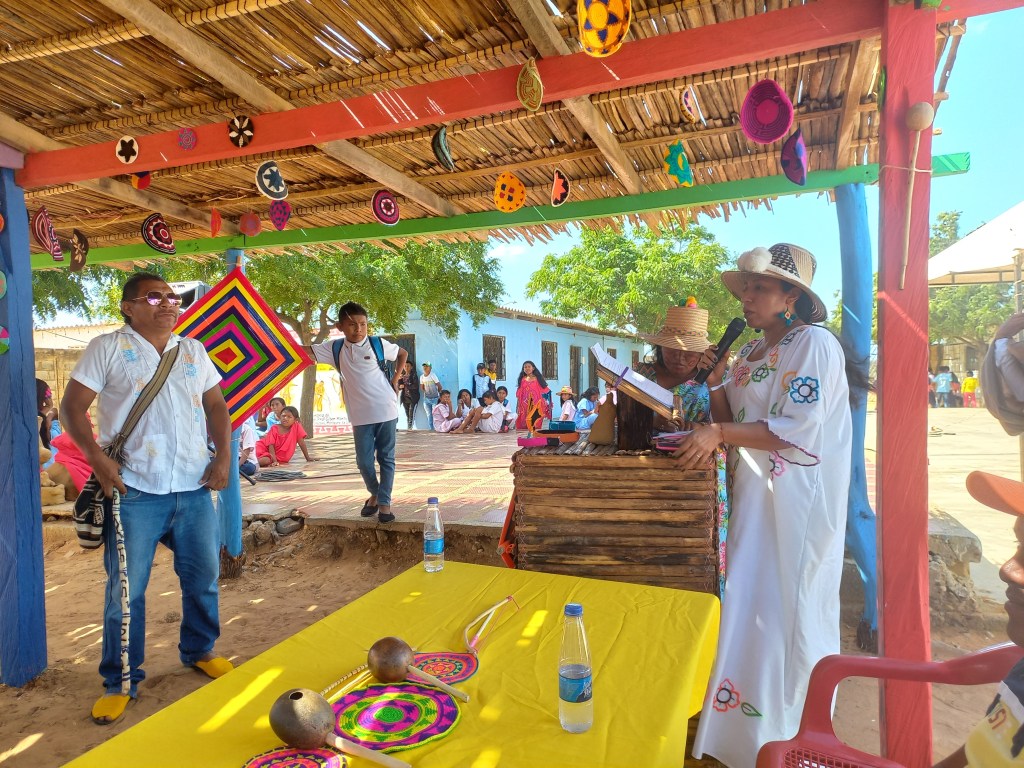
On the other hand, we also helped organize round tables with experts in several areas of knowledge: anthropology, ethnology, activists and teachers coming from many regions and areas of our continent..
Expanding our enthusiasm to other indigenous peoples
During these past 12 months we had the joy and honor of sharing, speaking, and listening to initiatives of other indigenous groups of the region, as we also shared our work in all of the previously mentioned spaces. During these talks and reflections we shared time and space with peoples and groups such as : Kaqchikel (Guatemala), Nawal (El Salvador), Yucatec Maya (México), Mapudungun (Chile), Wuitoto (Brasil), Wikimedistas de Bolívia [Wikimedians of Bolivia], Mais Teoria da história [More theory of History] (Brasil), Wikimedia Perú, Wikiacción Perú, Wikimedia Argentina and Wikimovimiento Brasil.
We have also had access to Talks and Conferences organized by UNESCO, Uniminuto, ISOC Colombia, KARISMA, UTOPÍA, Colnodo, HIGA alumni, Encuentro de Tierra común, Universidad Javeriana, and the Forum of Internet Governance of Colombia. In every single one of these spaces we’ve see new ideas and proposals for mutual help that we hope to make a reality… One of our goals is to create alliances that will benefit our communities, whether this is through knowledge transfer or developing joint initiatives.
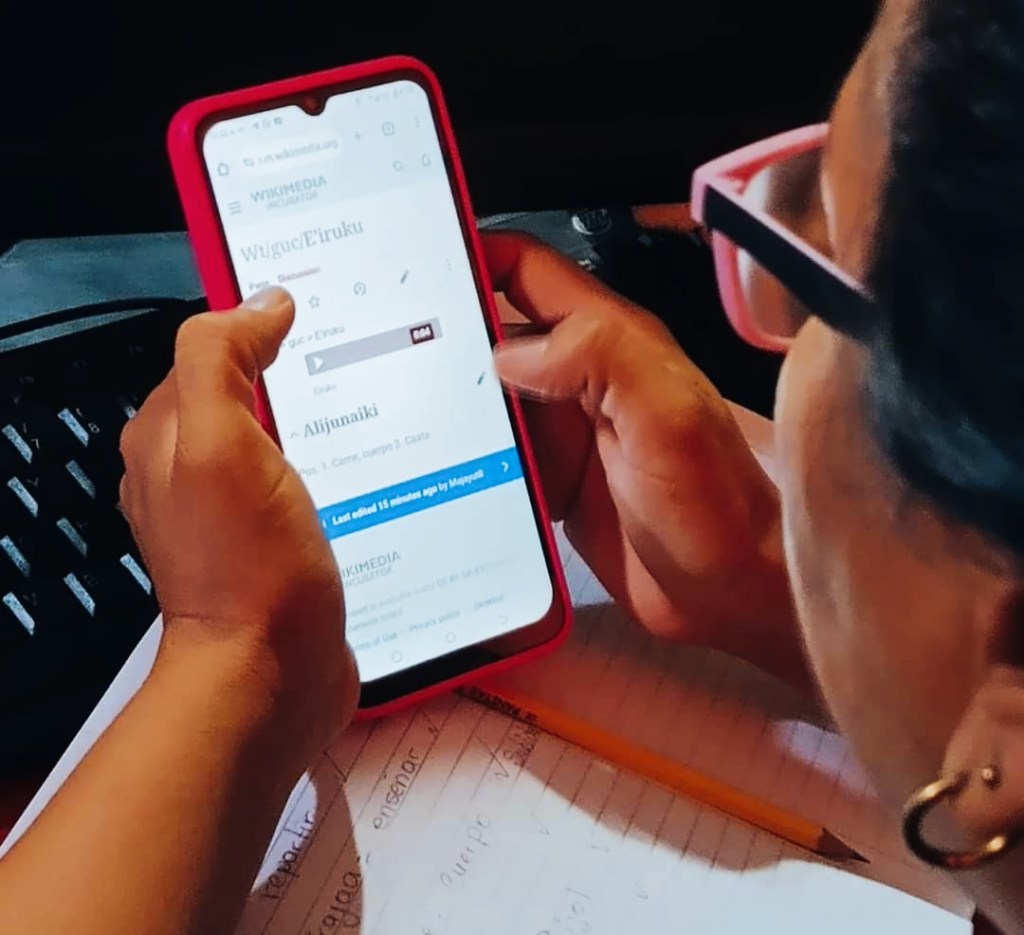
We have also continued developint the “Leamos Wikipedia en el aula [Let’s Read Wikipedia in the Classroom]” program, started by Wikimedia Colombia and where we adapt and contextualize contents. We also took part of the Wiki por los Derechos Humanos [Wiki for Human Rights] 2024 regional campaign, where we gave it our all, and put forth the impact of climate change on the wayuu communities.
Our work, aided in no small part by activism, has managed to encourage other local groups in the region, who recognize in our actions a way of connecting with their communities. At this point in the process, we feel committed to every experience we came in contact with, as we look forward to developing joint actions that will allow for a cohesive group of indigenous Wikimedians in our region.
Strategic alliances
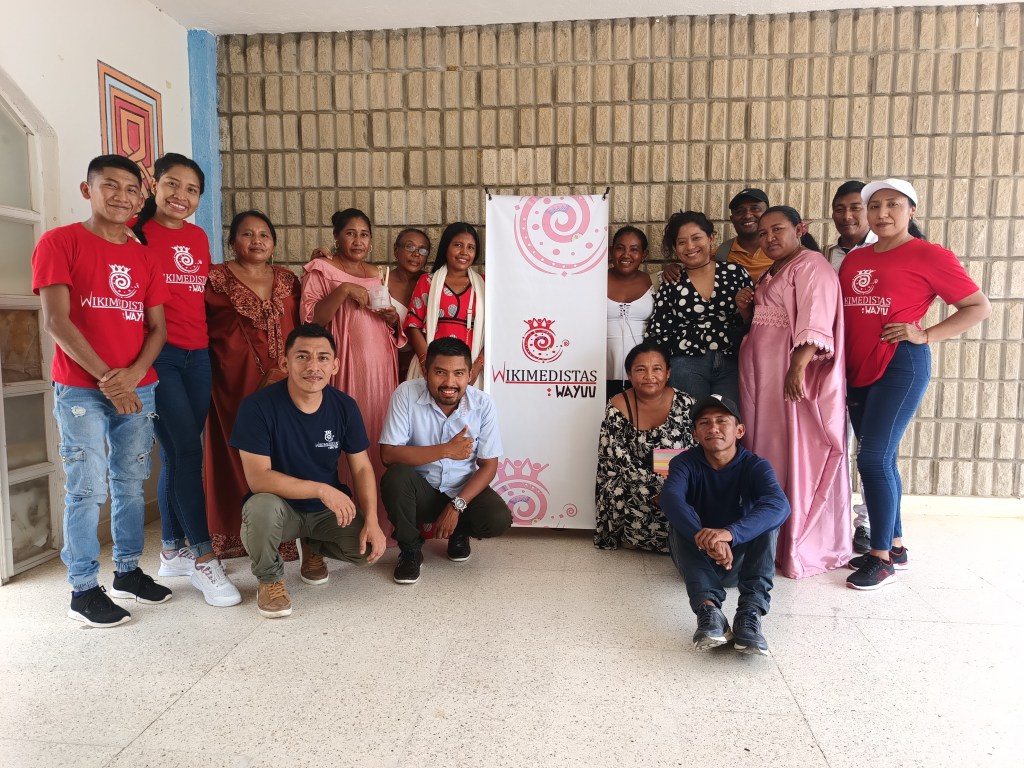
Wikimedistas Wayuu, ever since its inception as local group or collective, has aided the development of new leadership under the premise of territorialization of the Wikimedia projects and other similar or affine projects. Thanks to this, we’ve started getting help from other organizations and institutions—internal and external—that wish to join forces with their own, similar, lines of work and strategic plans, such as decolonizing information, media literacy, secure technologies, information access, or representation of local epistemes.
Among the institutions that have decided to join in this process we have: the Guajira Étnica Audiovisual Collective, headquartered in Manaure (La Guajira), the cultural team of the Bank of the Republic, Riohacha offices (La Guajira) and the Estudio Caribe Digital Collective, not to mention the future joint works between ISOC Colombia and Wikimedistas Wayuu.
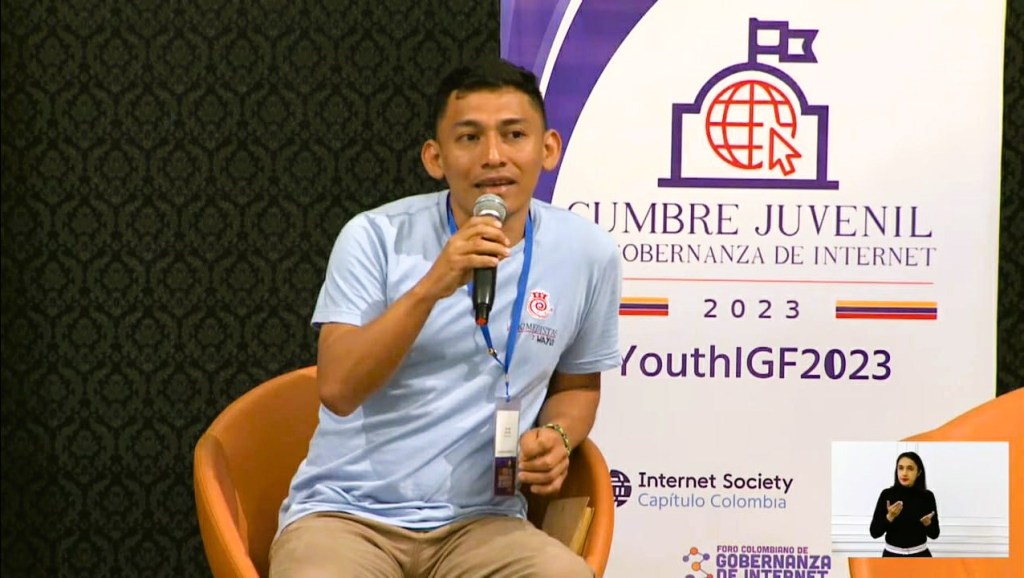
The previously mentioned alliances will help us in several lines of work, some of which are already part of our work route for 2024-2025. Among these we have:
- Access to contents from the Library of the Bank of the Republicin our local version of the network
- Actions for information access
- Training in documentation of cultural memories through audiovisual media, aided by the Guajira Étnica Audiovisual Collective
- Local networks and offline Wikipedia access, hand in had with Estudio Caribe Digital Collective
- Developing contents for local networks, WMWA version.
It’s worth mentioning that the above actions will be bi-national, given that leadership has been developed on both sides of the wayuu territory.
Next steps
During the following 12 months (2024-25), Wikimedistas Wayuu will continue working towards territorializing the Wikimedia projects with joint efforts with local and external institutions. They, as mentioned before, will work with us in certain lines of work that will develop projects such as Wikimedia Commons, local networks, and Wikipeetia. Similarly, we will work to join more communities in developing contents and working towards access to information in wayuunaiki.

We will also carry out more work developing spaces to dialogue and reflect along with other indigenous communities, as well as carrying out editing workshops with other groups. We will also continue encouraging the adaptation of Wikipedia projects’ interfaces to native langauges, as well as working to fulfill the requirements for them to graduate the incubator.
We have also decided to include tool developmeent, such as an Android app and Windows program, to encourage the use and learning of the wayuunaiki language. We will record wayuunaiki learning lessons by José Ramón Álvarez, one of the most prominent scholars of the wayuu language and the force behind a large number of contents on the correct use of wayuunaiki writings. These materials will be uploaded to different platforms to be shared with the community.
Acknowledgments
We want to express our infinite thanks to the leaders that make these actions possible, as well as the institutions that support us and our work; including: Wikimedia Foundation, KARISMA Foundation, UTOPIA Corp, WMCO, the Library of the Bank of the Republic, ISUR, Guajira Étnica Audiovisual Collective, and the Estudio Caribe Digital Collective.
Learn more about our experiences
Facebook: Wikimedistas Wayuu
Wikimedia Commons: Wikimedistas Wayuu
Instagram: @Wikipeetia_wayuu
Youtube channel: Wikimedistas Wayuu
Page on Meta: WikiMedistas Wayuu

Can you help us translate this article?
In order for this article to reach as many people as possible we would like your help. Can you translate this article to get the message out?
Start translation
